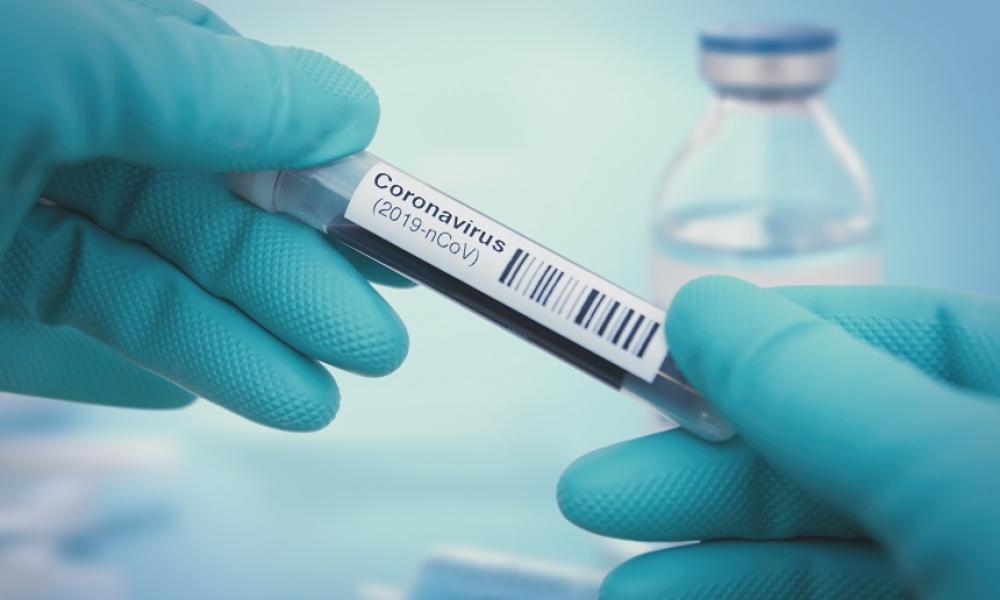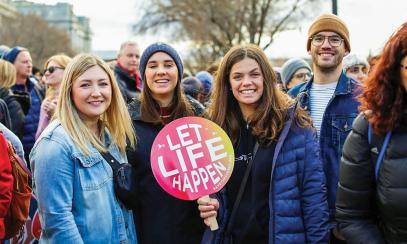
Coronavirus causes cancellation of Masses in Diocese of Lansing and other dioceses
Updated March 18, 2020
Special Report - COVID-19:
According to the Centers for Disease Control (CDC), the novel (new) coronavirus, first detected in China in December, has now been detected in the U.S. and at least 156 other countries and territories. On January 20, in collaboration with the CDC, state and local health departments in the U.S. began identifying and monitoring all persons who have had close contact with patients confirmed to have “coronavirus disease 2019” (“COVID-19”), the respiratory disease caused by the novel coronavirus, now identified as SARS-CoV-2.
SARS-CoV-2 is a member of a large family of viruses that are common in people and many different species of animals, including camels, cattle, cats, and bats. Though rare, people can become infected with animal coronaviruses and then spread the virus to other people. Like many of these viruses, SARS-CoV-2 originated in bats.
Many of the patients in Wuhan, China, where the outbreak was initially detected, had a common connection with a large seafood and live-animal market. Subsequent reports of the disease indicate that the virus was then being spread person-to-person in China and then in other countries. The virus from patients in the U.S. is similar to the one that China initially detected, indicating that it emerged from the same animal reservoir.
How does the virus spread?
The virus is thought to spread primarily from person to person, within six feet of proximity. Respiratory droplets are spread when an infected person sneezes or coughs. They land in the mouths or noses of others, and then are inhaled into their lungs. Although not thought to be the primary way, it may be possible to become infected by touching your mouth, nose or eyes after touching a surface that has the virus.
Currently, there is no evidence that the virus is transmitted through food, but the normal safety practice of washing hands with soap and water for 20 seconds before handling food should be observed. According to the CDC, coronaviruses generally have poor survivability on surfaces, so there is low risk that the virus will spread from food products or packaging shipped over a period of days or weeks at room temperature or below.
What are the symptoms of COVID-19?
The CDC website, https://www.cdc.gov/coronavirus/2019-nCoV/index.html, provides extensive information about COVID-19 and the response of health professionals around the world. Public awareness of the symptoms and how to report suspected cases is essential in mitigating the spread of the virus. COVID-19 can cause mild symptoms in some people but severe illness and death for others.
Symptoms may appear two-14 days after exposure and include:
- Fever
- Cough
- Shortness of breath
The CDC alert directs people to call their healthcare professional if they develop symptoms, and have been in close contact with a person known to have COVID-19, or if they have recently traveled from an area with widespread or ongoing community spread of COVID-19. Check cdc.gov for a list of areas where the virus is widespread.
How can I protect myself from being infected with COVID-19?
Since a vaccine or drug is not currently available for preventing or treating COVID-19, the CDC recommends that individuals take action to prevent the spread of the disease. The CDC offers the following guidance:
Practice everyday preventive actions now. Remind everyone in your household of the importance of practicing everyday actions that can help prevent the spread of respiratory illnesses:
- Avoid close contact with people who are sick.
- Stay home when you are sick, except to get medical care.
- Cover your coughs and sneezes with a tissue.
- Clean frequently touched surfaces and objects daily (e.g., tables, countertops, light switches, doorknobs, and cabinet handles) using a regular household detergent and water. If surfaces are dirty, they should be cleaned using a detergent and water prior to disinfection.
- Wash your hands often with soap and water for at least 20 seconds, especially after going to the bathroom; before eating; and after blowing your nose, coughing, or sneezing. If soap and water are not readily available, use a hand sanitizer that contains at least 60% alcohol. Always wash your hands with soap and water if your hands are visibly dirty.
Archbishop Responds to COVID-19 Outbreak in Washington State
Archbishop José H. Gomez of Los Angeles, president of the U.S. Conference of Catholic Bishops, (USCCB) issued the following statement March 13 regarding Coronavirus (COVID-19):
With the worldwide outbreak of the coronavirus, we are confronted once more with the fragility of our lives, and again we are reminded of our common humanity — that the peoples of this world are our brothers and sisters, that we are all one family under God.
God does not abandon us, he goes with us even now in this time of trial and testing. In this moment, it is important for us to anchor our hearts in the hope that we have in Jesus Christ. Now is the time to intensify our prayers and sacrifices for the love of God and the love of our neighbor. Let us draw closer to one another in our love for him, and rediscover the things that truly matter in our lives.
United with our Holy Father Pope Francis, let us pray in solidarity for our brothers and sisters here and around the world who are sick. Let us pray for those who have lost loved ones to this virus. May God console them and grant them peace.
We pray also for doctors, nurses, and caregivers, for public health officials and all civic leaders. May God grant them courage and prudence as they seek to respond to this emergency with compassion and in service to the common good.
In this time of need, I invite all the faithful to seek together the maternal intercession of Our Lady of Guadalupe, and I share this prayer with you: (prayer)
Prayer to Our Lady of Guadalupe
Holy Virgin of Guadalupe,
Queen of the Angels and Mother of the Americas.
We fly to you today as your beloved children.
We ask you to intercede for us with your Son,
as you did at the wedding in Cana.
Pray for us, loving Mother,
and gain for our nation and world,
and for all our families and loved ones,
the protection of your holy angels,
that we may be spared the worst of this illness.
For those already afflicted,
we ask you to obtain the grace of healing and deliverance.
Hear the cries of those who are vulnerable and fearful,
wipe away their tears and help them to trust.
In this time of trial and testing,
teach all of us in the Church to love one another and to be patient and kind.
Help us to bring the peace of Jesus to our land and to our hearts.
We come to you with confidence,
knowing that you truly are our compassionate mother,
health of the sick and cause of our joy.
Shelter us under the mantle of your protection,
keep us in the embrace of your arms,
help us always to know the love of your Son, Jesus. Amen.
Prayer to St. Roch (patron of contagious illnesses)
O Blessed Saint Roch, Patron of the sick, Have pity on those Who lie upon a bed of suffering.
Your power was so great When you were in this world, That by the sign of the Cross, Many were healed of their diseases.
Now that you are in heaven, Your power is not less. Offer, then, to God Our sighs and tears And obtain for us that health we seek Through Christ our Lord.
Amen.
(Repeat the following 3 times)
Saint Roch, pray for us, That we may be preserved From all diseases of body and soul.
A prayer for spiritual communion written by St. Alphonsus Ligouri:
"My Jesus, I believe you are really here in the Blessed Sacrament.
I love you more than anything in the world, and I hunger to receive you.
But since I cannot receive Communion at this moment,
feed my soul at least spiritually.
I unite myself to you now as I do when I actually receive you."
Pope Francis Prayer
O Mary, you shine continuously on our journey as a sign of salvation and hope.
We entrust ourselves to you, Health of the Sick.
At the foot of the Cross you participated in Jesus’ pain,
with steadfast faith.
You, Salvation of the Roman People, know what we need.
We are certain that you will provide, so that,
as you did at Cana of Galilee,
joy and feasting might return after this moment of trial.
Help us, Mother of Divine Love,
to conform ourselves to the Father’s will
and to do what Jesus tells us:
He who took our sufferings upon Himself, and bore our sorrows to bring us,
through the Cross, to the joy of the Resurrection. Amen.
We seek refuge under your protection, O Holy Mother of God.
Do not despise our pleas – we who are put to the test – and deliver us from every danger, O glorious and blessed Virgin.
Catholics Encouraged to practice “Spiritual Communion” during COVID-19 Epidemic
After the Angelus prayer on March 3, Pope Francis invited the faithful “to rediscover and deepen the value of the communion that unites all the members of the Church. United to Christ we are never alone, but we form one single Body, of which He is the Head.”
Pope Francis encouraged those unable to attend Church to pray for spiritual communion, “a practice that is highly recommended when it is not possible to receive the Sacrament.” Archbishops and bishops in the U.S. join the pope in inviting the faithful to this practice.
In his encyclical, Ecclesia de Eucharistia, Pope John Paul II explained how the essential role of the Eucharist in uniting us to Christ led to the practice of “spiritual communion”:
In the Eucharist, "unlike any other sacrament, the mystery [of communion] is so perfect that it brings us to the heights of every good thing: Here is the ultimate goal of every human desire, because here we attain God and God joins himself to us in the most perfect union."
Precisely for this reason it is good to cultivate in our hearts a constant desire for the sacrament of the Eucharist. This was the origin of the practice of "spiritual communion," which has happily been established in the Church for centuries and recommended by saints who were masters of the spiritual life. St. Teresa of Jesus wrote: "When you do not receive communion and you do not attend Mass, you can make a spiritual communion, which is a most beneficial practice; by it the love of God will be greatly impressed on you" [The Way of Perfection, Ch. 35.].1.
What Is spiritual communion?
Spiritual Communion is the practice of desiring union with Jesus Christ in the Holy Eucharist. It is used primarily by individuals who cannot receive Holy Communion, such as the ill, the divorced and remarried, and those who have not yet been received into full communion with the Church. St. Thomas Aquinas described it as “an ardent desire to receive Jesus in the most holy sacrament and lovingly embrace him” at a time or in circumstances when we cannot receive him in sacramental Communion.
Act of Spiritual Communion
My Jesus,
I believe that you are
present in the Most Holy Sacrament.
I love you above all things, and I desire
to receive you into my soul.
Since I cannot at this moment
receive you sacramentally,
come at least spiritually
into my heart. I embrace you
as if you were already there and
unite myself wholly to you.
Never permit me to be
separated from you. Amen.
In addition to St. Teresa of Jesus, other saints have encouraged spiritual communion:
“Communion is to the soul like blowing a fire that is beginning to go out, but that has still plenty of hot embers; we blow, and the fire burns again.”
“After the reception of the Sacraments, when we feel ourselves slacken in the love of God, let us have recourse at once to spiritual communion. When we cannot go to the church, let us turn towards the tabernacle; no wall cannot separate us from the good God.” St. John Vianney
Spiritual Communion is “an ardent desire to receive Jesus in the Holy Sacrament and a loving embrace as though we had already received Him.” St. Thomas Aquinas
“What a source of grace there is in spiritual Communion! Practice it frequently and you'll have more presence of God and closer union with him in your life.” St. Josemaría Escrivá.
Response of Catholic Dioceses to COVID-19 Update March 18, 2020
All public Masses are suspended in the following archdioceses and dioceses:
Archdiocese of Anchorage
Archdiocese of Atlanta
Archdiocese of Baltimore
Archdiocese of Boston
Archdiocese of Chicago
Archdiocese of Cincinnati
Archdiocese of Denver
Archdiocese of Detroit
Archdiocese of Dubuque
Archdiocese of Galveston-Houston
Archdiocese of Hartford
Archdiocese of Indianapolis
Archdiocese of Kansas City in Kansas
Archdiocese of Los Angeles
Archdiocese of Louisville
Archdiocese of Miami
Archdiocese of Milwaukee
Archdiocese of Mobile
Archdiocese of New Orleans
Archdiocese of New York
Archdiocese of Newark
Archdiocese of Oklahoma City
Archdiocese of Omaha
Archdiocese of Philadelphia
Archdiocese of Portland in Oregon
Archdiocese of San Antonio
Archdiocese of San Francisco
Archdiocese of Santa Fe
Archdiocese of Seattle
Archdiocese of St Louis
Archdiocese of the Military Services
Archdiocese of Washington
Diocese of Albany
Diocese of Alexandria
Diocese of Allentown
Diocese of Amarillo
Diocese of Arlington
Diocese of Austin
Diocese of Baker
Diocese of Baton Rouge
Diocese of Biloxi
Diocese of Birmingham
Diocese of Bismarck
Diocese of Boise
Diocese of Bridgeport
Diocese of Brooklyn
Diocese of Buffalo
Diocese of Camden
Diocese of Charleston
Diocese of Cheyenne
Diocese of Cleveland
Diocese of Colorado Springs
Diocese of Columbus
Diocese of Covington
Diocese of Crookston
Diocese of Dallas
Diocese of Davenport
Diocese of Des Moines
Diocese of Dodge City
Diocese of Duluth
Diocese of Erie
Diocese of Evansville
Diocese of Fairbanks
Diocese of Fall River
Diocese of Fargo
Diocese of Fort Wayne-South Bend
Diocese of Fresno
Diocese of Gallup
Diocese of Gary
Diocese of Gaylord
Diocese of Grand Island
Diocese of Grand Rapids
Diocese of Great Falls-Billings
Diocese of Green Bay
Diocese of Greensburg
Diocese of Harrisburg
Diocese of Helena
Diocese of Honolulu
Diocese of Houma-Thibodaux
Diocese of Jackson
Diocese of Jefferson City
Diocese of Joliet
Diocese of Juneau
Diocese of Kansas City - St Joseph
Diocese of Knoxville
Diocese of La Crosse
Diocese of Lafayette in Indiana
Diocese of Lafayette in Louisiana
Diocese of Lake Charles
Diocese of Lansing
Diocese of Laredo
Diocese of Las Cruces
Diocese of Las Vegas
Diocese of Lexington
Diocese of Lincoln
Diocese of Little Rock
Diocese of Madison
Diocese of Manchester
Diocese of Memphis
Diocese of Metuchen
Diocese of Nashville
Diocese of New Ulm
Diocese of Norwich
Diocese of Oakland
Diocese of Ogdensburg
Diocese of Paterson
Diocese of Peoria
Diocese of Phoenix
Diocese of Pittsburgh
Diocese of Providence
Diocese of Pueblo
Diocese of Raleigh
Diocese of Rapid City
Diocese of Reno
Diocese of Richmond
Diocese of Rochester
Diocese of Rockville Centre
Diocese of Saginaw
Diocese of Salina
Diocese of Salt Lake City
Diocese of San Angelo
Diocese of San Diego
Diocese of San Jose
Diocese of Santa Rosa
Diocese of Savannah
Diocese of Scranton
Diocese of Shreveport
Diocese of Sioux City
Diocese of Sioux Falls
Diocese of St Cloud
Diocese of St Thomas, VI
Diocese of Steubenville
Diocese of Stockton
Diocese of Toledo
Diocese of Trenton
Diocese of Tucson
Diocese of Tyler
Diocese of Victoria
Diocese of Wheeling-Charleston
Diocese of Wichita
Diocese of Wilmington
Diocese of Worcester
Diocese of Yakima
Diocese of Youngstown
Diocese of Owensboro
Diocese of Sacramento
Diocese of San Bernardino
Diocese of Spokane
Diocese of Springfield in Illinois
Diocese of Springfield, Mass
Diocese of St Petersburg
Diocese of St. Thomas
Diocese of Syracuse
Diocese of Venice
Diocese of Orlando
Diocese of St Augustine
Diocese of Springfield-Cape Girardeau
Diocese of Superior
Diocese of Monterey
Diocese of Palm Beach
Diocese of Burlington
Diocese of Belleville
Diocese of Rockford
Diocese of Pensacola-Tallahassee
Diocese of Portland in Maine
Diocese of Marquette
Diocese of Orange
The Diocese of Charlotte has suspended public Masses for groups of more than 10.
The following archdiocese and dioceses have granted a dispensation from attending Sunday Mass to all Catholics:
Archdiocese of St Paul & Minneapolis
Diocese of Altoona-Johnstown
Diocese of Brownsville
Diocese of Kalamazoo
Diocese of Winona-Rochester
Dioceses that have granted conditional dispensations from attending Sunday Mass:
The Diocese of Tulsa dispenses Catholics from the Sunday obligation to attend Mass if they are at risk of becoming ill because of a medical condition or if they are a caregiver of someone who is at risk.
The Diocese of Fort Worth grants a dispensation from the Sunday obligation to attend Mass to all who are ill or concerned about becoming ill
The Dioceses of Lubbock and Beaumont grant a dispensation from the obligation to attend Sunday Mass to those over the age of 60, who are ill, or those who have serious concerns about becoming ill
The Diocese of Corpus Christi is limiting Masses to no more than 250 people.
The Diocese of El Paso is weighing options for celebrating public Masses.



